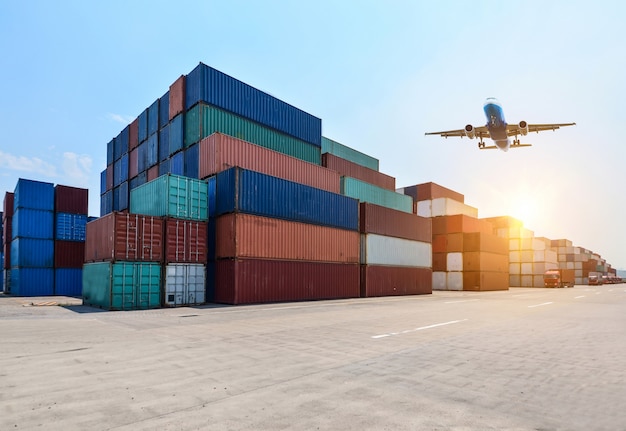When you want to use a shipping service, you may encounter many terms that it is necessary to know them very well because this will help you choose one service with full knowledge.
Thanks to the Internet these days, you can effortlessly search for everything that you need information. However, don’t trust every website. It is better to get information from reputable websites.
There are several terms, such as DDP, EXW, FOB, and so on. In each term, some tasks are assigned to the seller and some to the buyer.
This article aims to talk about DDP VS EXW. After finishing this article, you will have enough knowledge.

What are incoterms?
Before we talk about DDP VS EXW, it is better to be familiar with incoterms. It is the abbreviation of “International Commercial Terms,” and the “International Chamber of Commerce” has designed it.
This term is used to distinguish costs and responsibilities between sellers and buyers. This term also covers matters such as the following:
- Transportation of goods
- Clearance of goods
- Importing and exporting of goods
- Who is responsible for payment
- Who is responsible for the risk of moving and transferring goods at different stages
And other matters related to freight forwarding from sellers to buyers.
By this definition, we can say that this term is about all international trading rules for selling and transporting goods.
When you want to import or export, you need to refer to these rules.
DDP VS EXW
In DDP VS EXW, it is necessary to know each term well; they are as follows:
DDP is:
- Delivered Duty Paid
It means that:
- The Seller clears the goods for import, and at the designated place in the destination, the goods are ready to be unloaded and delivered to the buyer on the means of transport.
- The Seller assumes all costs and risks related to bringing the goods to the designated destination, and he is responsible not only for the clearance of goods for export but also for the import clearance of goods, as well as the payment of any export and import duties and all customs formalities. It is the responsibility of the Seller.
EXW is as follows:
- The Seller must provide the goods to the buyer at his workplace or another designated place.
- The Seller’s delivery of the goods does not require loading it on the means of transport, nor is clearance of the goods for export if this necessary.
- The parties are well aware that they must specify the place of delivery of the goods as clearly as possible because all costs and risks up to that point are the responsibility of the Seller.
Now, it is time to talk about DDP VS EXW.

DDP
In DDP VS EXW, we talk about DDP at first.
The Seller’s task in DDP, for DDP VS EXW.
DDP considers the maximum duty for the Seller, and it is important in the DDP VS EXW discussion.
The task of the Seller in this term is as below:
- The Seller must prepare the goods and the business list under the contract of sale and any other proof of conformity that may be required by the contract.
- Depending on the case, the Seller must, at her/his own expense and risk, obtain any import and export licenses or other official permits and perform all necessary customs formalities for the export of goods and their transport through any country for import.
- The Seller must deliver the goods to the buyer on the means of transport, ready to be unloaded at the agreed point, if any, at the designated place of destination, on the date or within the agreed time limit.
- The Seller accepts all risks arising from the loss or damage.
- The Seller must pay all costs relating to the goods up to the time of delivery and any cost of unloading the goods at the place specified in the destination according to the contract of carriage; and depending on the case, the costs of customs formalities required for the export and import of goods, as well as all duties, taxes and other costs payable on export and import and shipping costs of goods from any country.
- The Seller must provide any notice required for the buyer to take action to receive the goods.
- The Seller must carry out those inspection operations (such as quality inspection, measurement, distribution, counting) that are necessary for the delivery of the goods, the Seller must pay the cost of any pre-shipment review ordered by the authorities of the exporting country or importer.
- The Seller must pack the goods at his own expense unless, in a particular trade, the goods sold are not packaged typically.
- The Seller can pack the goods according to the transport method unless the buyer prepares a specific type of packaging before concluding the sales contract, and he/she must inform the Seller. The packaging must be marked appropriately.
- The Seller must provide any documents and information, including security information of the goods that the buyer needs to transport to the final destination, or assist him in obtaining them, depending on the case, time, and request of the buyer,
The Buyer task in DDP, in DDP VS EXW
The buyer task in DDP for DDP VS EXW are as below:
- The buyer must pay the price of the goods in the order provided in the sales contract.
- Depending on the case, the buyer must assist the Seller in obtaining an entry permit or other official entry permits at the Seller’s request, cost, and risk.
- The buyer must receive the goods when they are delivered.
- The buyer accepts all risks arising from the loss or damage to the goods from when the goods are delivered.
- The buyer has no obligation to the Seller to pay for any pre-shipment inspection that has been mandated by the authorities of the exporting country and the importing country.
The insurance contract in DDP
When it is the DDP VS EXW discussion, it is necessary to know about each term’s insurance contract. The insurance contract in DDP is as follows:
A) Shipping contract
- At his own expense, the Seller must enter into a contract for the carriage of goods to the designated place or agreed point. If a specific point is not approved or practically not determined, the Seller can choose the most appropriate point in the designated area or destination for his purpose.
B) Insurance contract
- The Seller has no obligation to the buyer to conclude an insurance contract. However, at the request, risk, and cost (if any) of the buyer, the Seller must provide the buyer with the necessary information to provide insurance.
EXW
In DDP VS EXW, now, it is time to talk about EXW.
The Seller’s task in EXW, for DDP VS EXW
- The Seller must prepare the goods and the business list under the sales contract and provide any other proof of compliance required by the contract.
- The Seller must assist the buyer in obtaining any export license or other official permits as are necessary for the export of the goods, depending on the case, at the buyer’s request, risk, and cost.
- The Seller must deliver the goods at the agreed point and if there is no such point, at the designated place, without loading on the means of transport.
The buyer’s task in EXW, for DDP VS EX
In the DDP VS EXW, the task of the buyer is essential, that they are as following:
- The buyer must pay the price of the goods in the order specified in the contract of sale.
- The buyer must obtain at her own expense and, if necessary, any import and export licenses or other official permits, including security clearances, and perform all customs formalities to export goods.
- The buyer accepts all risks from the loss or damage to the goods from when the goods are delivered.
- The buyer must pay all costs related to the goods from the time of delivery and any additional costs resulting from his failure to deliver the goods.
- The buyer must pay all duties, taxes, and other costs and expenses incurring customs formalities for the export of goods, as the case may be
- The buyer shall reimburse all costs and expenses incurred by the Seller for assistance.
- The buyer must pay for any pre-shipment inspections, including inspections ordered by the issuing country’s authorities.
An insurance contract in EXW
An insurance contract is essential in DDP VS EXW. In EXW, it is as following:
A) Shipping contract
- The buyer has no obligation to the Seller to conclude the contract of carriage. And the Seller has no obligation to the buyer to terminate the contract of carriage.
B) Insurance contract
- The buyer has no obligation to the Seller to conclude the insurance contract. And the Seller has no obligation to the buyer to complete the insurance contract. However, the Seller may be willing to provide the buyer with the information he needs to terminate the insurance contract.
Concluding remarks
In this article, we tried to provide all vital information for you to know DDP VS EXW.
For more and detailed information, you can consult with professionals in this field.
DDPCH
Dear customers
If you need an impressive rate and competitive offer for Door to Door Rail and Trucking service from China to European countries, please contact our Sale Team.
Are there any other names for EXW?
Yes! it may also be referred to as Ex Factory, EX warehouse and EX Mill.






